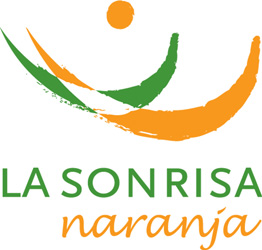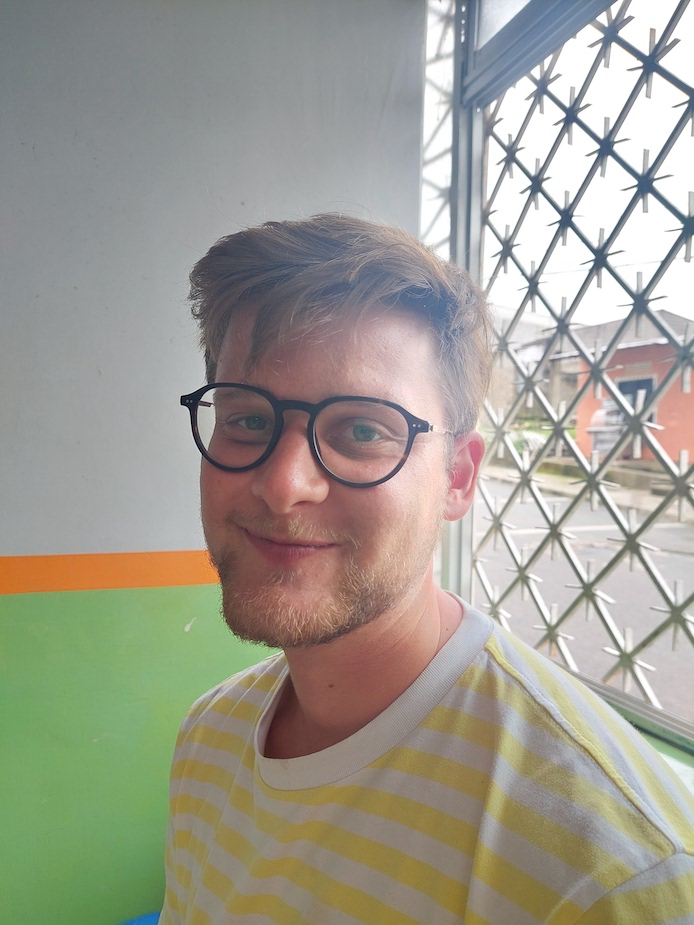 Hola! My name is Sebastian Sippach, I am a 26-year-old medicine student from Groningen and just finished my 8-week social medicine coschap at the Fundación La Sonrisa Naranja in Guayaquil, Ecuador. In this blog, I will share my experiences, impressions, highlights, and lessons learnt during this unique time with Els, Gonzalo, and the whole team from the Centro de Salud.
Hola! My name is Sebastian Sippach, I am a 26-year-old medicine student from Groningen and just finished my 8-week social medicine coschap at the Fundación La Sonrisa Naranja in Guayaquil, Ecuador. In this blog, I will share my experiences, impressions, highlights, and lessons learnt during this unique time with Els, Gonzalo, and the whole team from the Centro de Salud.
But let’s go back to the beginning of January 2023. For almost a year I organised a tropical and social medicine coschap in Peru, unfortunately, due to the political unstable situation there, I had to cancel my plans last minute. Devastated I contacted my university to find another possibility for me to travel to Southamerica and still organise a coschap there. Fortunately, they provided me with Els’ phone number! One quick phone call later with Els, a long phone call later with Iberia Airlines and I was ready to follow my coschap in Guayaquil, Ecuador.
Daily life as a coassistent in Guayaquil
First days are always exciting, and once I have arrived in Guayaquil I couldn’t wait to finally begin with my internship! Doctora Els and her whole team welcomed me with open arms and gave me a quick tour of the Centro de Salud, which is located in El Fortin, one of the poorest neighbourhoods of Guayaquil. As it was a very busy day, Els and I quickly started with the first consultations. In the beginning of my internship, my role as a coassistent was to examine the patients, reason based on the anamnesis and clinical presentation of the patient what diagnostics might be necessary and finally what treatment options I would suggest. So far not too different from my experiences from other coschappen in the Netherlands one might think? Obviously, there were many challenges, impressions and considerations I was never confronted with during consultations the Netherlands!
Clearly, Spanish was one of them in the beginning. Although I used to be on a decent Spanish level beforehand, in most South American countries there are different accents or dialects, Ecuador was not an exception, so there was a lot for me to learn. Often it was the small nuances that made a big difference and now I know for example that you do not say “Adiós” in Ecuador, unless you say a proper farewell to someone. In this sense working together with Els was a huge enrichment as she could give me constant feedback on my Spanish skills.
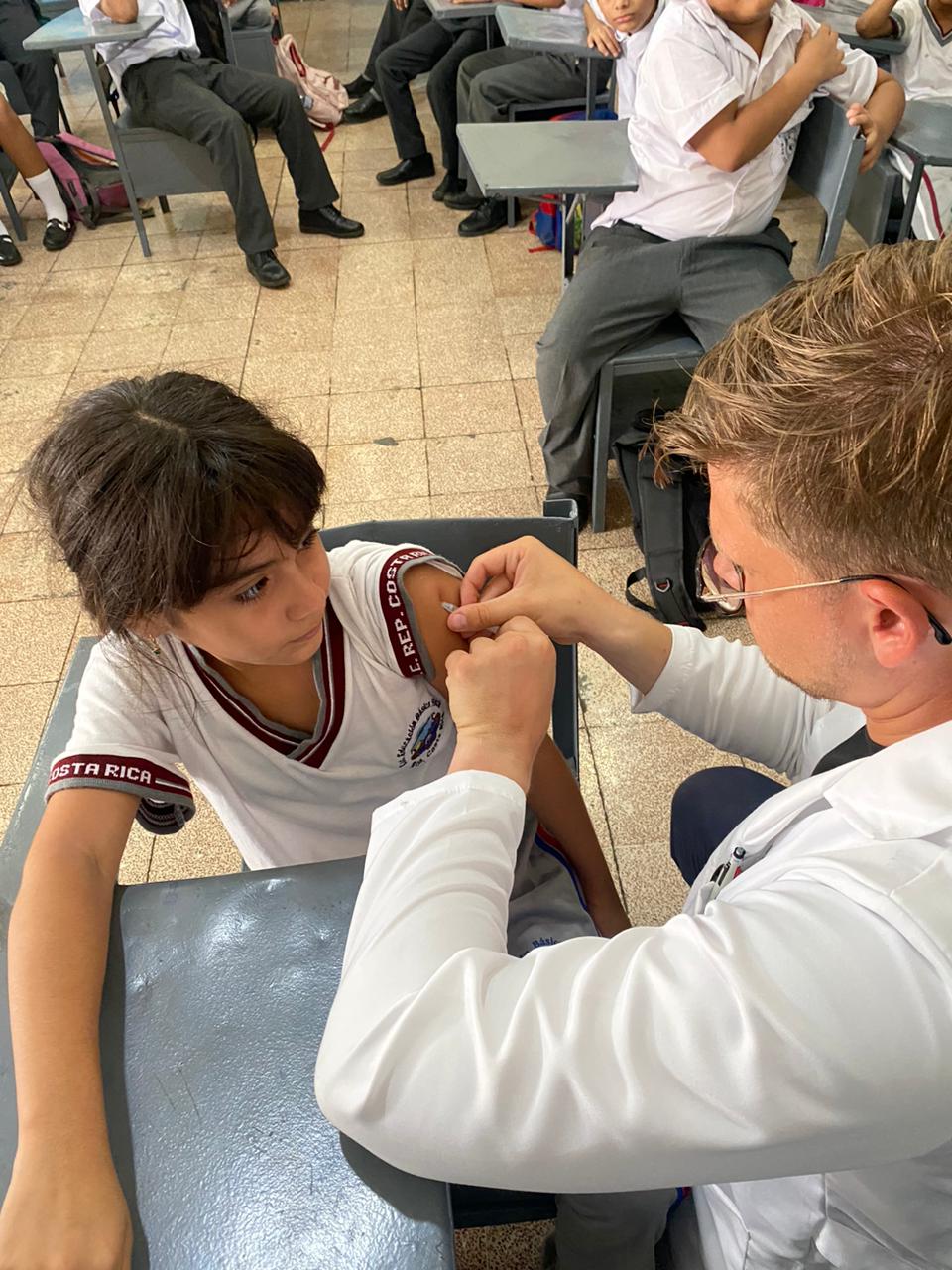 Most patients we saw during our consultations were women or children with predominantly general medical problems, pregnancy sonographies or general medical controls. However, as I was working in a tropical setup, one could never disregard tropical diseases such as dengue, parasitical infections or typhus in your differential diagnosis. Another major difference to the Netherlands were the patients’ expectations towards a consultation. As a broad variety of medication, such as antibiotics, is available over the counter in Ecuador, patients have not only often auto-medicated themselves before seeing a doctor, but therefore, they also expect leaving a consultation with a prescription for medication – e.g., antibiotics. Certainly, compared to the Netherlands, antibiotics were prescribed more abundantly, but never carelessly. Although, in the beginning I had my concerns about that, in view of feeding into antibiotic resistances, which will be one of the main global health concerns in the future, the protocols for antibiotics I am following in the Netherlands are not always applicable in practice in Ecuador. The climate, poor hygiene conditions and often restricted possibilities for follow-up consultations are one of the factors, which one also has to take into consideration for that matter. Generally, as I am educated in a system that focuses a lot on protocols, I enjoyed learning how to make use of the advantages of them in a context where they have a benefit for the patient, but at the same time where I as a doctor am more flexible in the decision making.
Most patients we saw during our consultations were women or children with predominantly general medical problems, pregnancy sonographies or general medical controls. However, as I was working in a tropical setup, one could never disregard tropical diseases such as dengue, parasitical infections or typhus in your differential diagnosis. Another major difference to the Netherlands were the patients’ expectations towards a consultation. As a broad variety of medication, such as antibiotics, is available over the counter in Ecuador, patients have not only often auto-medicated themselves before seeing a doctor, but therefore, they also expect leaving a consultation with a prescription for medication – e.g., antibiotics. Certainly, compared to the Netherlands, antibiotics were prescribed more abundantly, but never carelessly. Although, in the beginning I had my concerns about that, in view of feeding into antibiotic resistances, which will be one of the main global health concerns in the future, the protocols for antibiotics I am following in the Netherlands are not always applicable in practice in Ecuador. The climate, poor hygiene conditions and often restricted possibilities for follow-up consultations are one of the factors, which one also has to take into consideration for that matter. Generally, as I am educated in a system that focuses a lot on protocols, I enjoyed learning how to make use of the advantages of them in a context where they have a benefit for the patient, but at the same time where I as a doctor am more flexible in the decision making.
Finally, one of the major challenges during my time at the Centro Medico was the low socioeconomic setting of most patients that we saw and the challenges that come with it. Although the Fundación offers primary healthcare for very cheap money compared to other private medical centres, it is unfortunately not possible to provide it for free yet. The socioeconomic background one always had to take into consideration during the consultations. Is it necessary to perform a blood examination or an additional sonography for a patient? Could they finance it? What would be the consequences for the family if this money is missing, if already seeing a doctor for a consultation often means financial restrictions for the rest of the family for the next days? Questions one was constantly confronted with and that made me put a lot of my own privileges into perspective. Especially difficult was, that even though patients would receive a prescription at the end of the consultation, you would often not know if they could actually afford the medication and what would happen to them.
Well, soon enough Els also let me do entire consultations alone in Spanish, and let’s just say it was overwhelming and explaining what benign paroxysmal positional vertigo is to a patient in Spanish was quite the challenge. However, it was exactly the challenge I was looking for, and I was incredibly happy to notice how much easier it got with time!
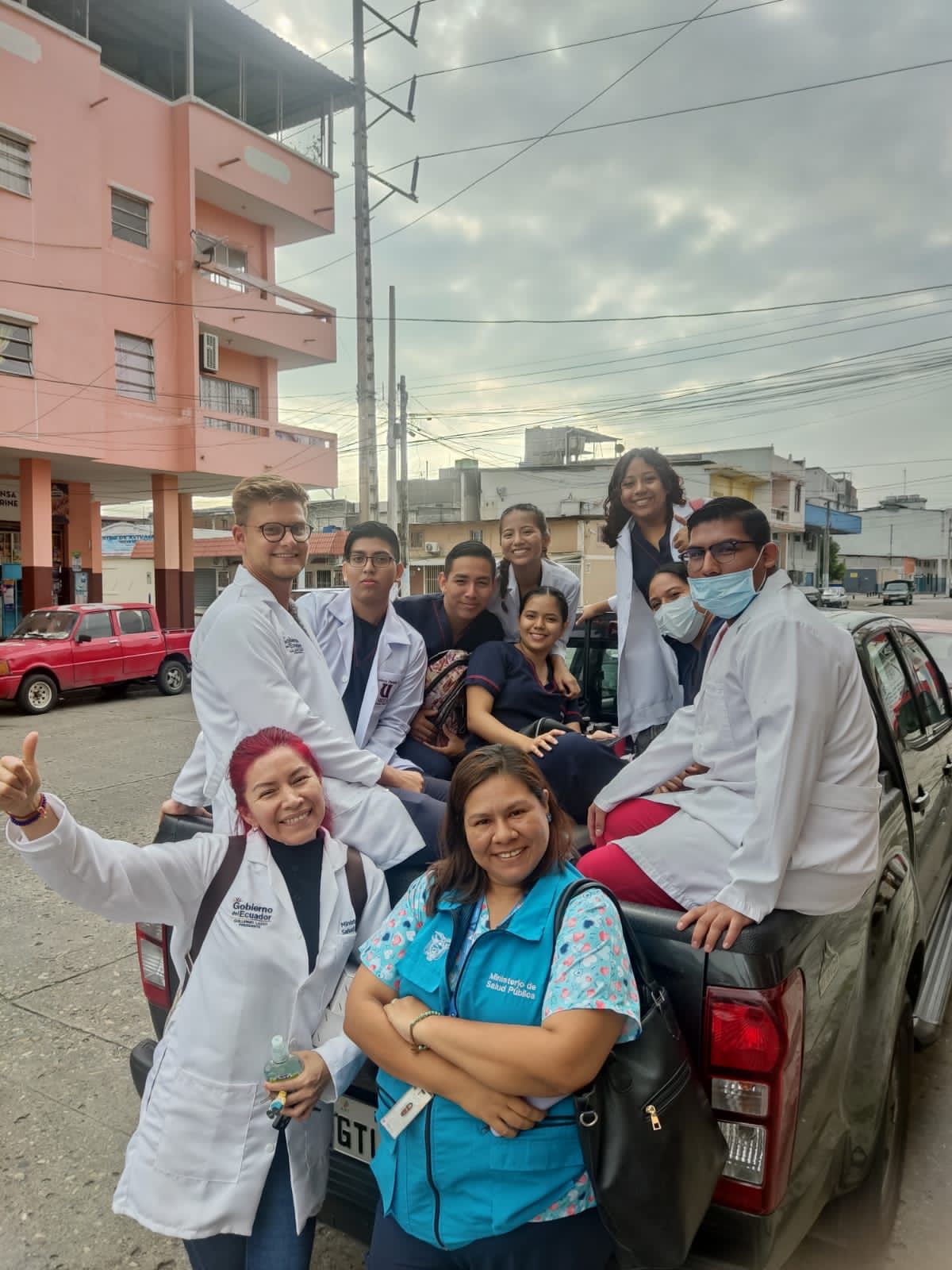
Working with Els
Els is definitely one of the most inspiring doctors I have met so far and a big role model to me! She has a unique bond with the community of the neighbourhood and her patients, as well as an immense background knowledge of the personal situations and problems of her patients and therefore you notice how much her patients appreciate her and her team being there. With her energy and determination, she and her team are making a big difference for the people in El Fortín. As a supervisor, we had great discussions about patient cases, treatment options, comparisons between the Netherlands and Ecuador, but most importantly she gave me an insight into the problems, challenges and dynamics of the neighbourhood I was working in. Also, I had not a single boring moment with her, she always finds an original story or topic to talk about, be prepared for a “gezellige” time.
El Barrio Horizontes del Fortín
As mentioned before, El Fortín is a developing neighbourhood in Guayaquil and socioeconomic problems are determining the lives of most people of the community. Unstable jobs and irregular incomes are forcing many people to live hand to mouth. Existential anxiety, split-up families and violence at home are common scenarios in the daily lives of many locals. Towards me all patients were incredibly friendly, respectful and patient with my Spanish and often you would forget what they are actually going through every day. Unfortunately, during the last 2 years El Fortín became a melting pot for drug gang criminality and drug addictions, which is especially sucking in the adolescents of the neighbourhood, however it has a firm grip on everyone in the community. For me it is still difficult to grasp the psychological burden families are experiencing in El Fortín every day. How can we overcome this vicious circle and what perspective in life do you have growing up in such a neighbourhood? Questions I am still trying to find an answer to myself.
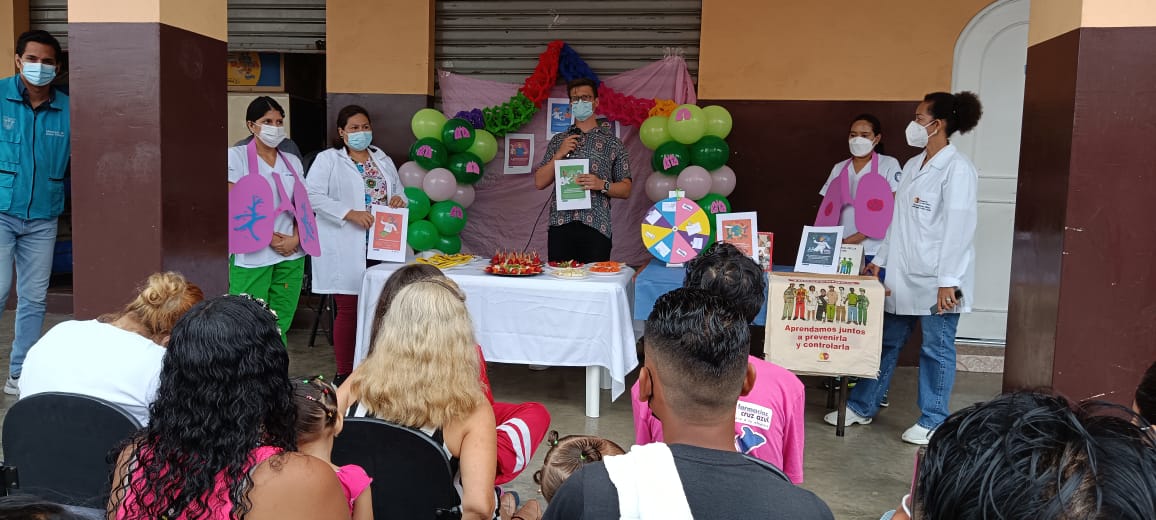
Summer school
Luckily, Els and Gonzalo have already found some answers to those questions. With different social projects including especially children or adolescents of the neighbourhood, they are trying to break through the vicious circle. I was fortunate enough being at the Centro de Salud during one of their projects – the summer school for young children. In Ecuador, during school vacation, families with the financial means are sending their children off to summer camps. For most people in El Fortín, this is not financially feasible. Consequently, children are staying at home, inside, as playing on the streets is currently too dangerous - for several weeks! Els and her team offered 40 children everyday a safe environment, with a teacher, to be creative, curious, to learn, dance or make music together – for free. On top, excursions to parcs or museums were planned, probably a first time for many children of the neighbourhood. The highlight, an excursion to the firefighter museum in Guayaquil, obviously now all children want to become a firefighter! This is how you create perspectives, stimulate children and move a lot with little. Just seeing the excitement of the children everyday was definitely one of the highlights of my internship.
Lessons learnt and new perspectives
Where do I start? Firstly, of course I learnt a lot about medical healthcare in a tropical setting. Don’t give paracetamol to a child with fever, it could be Dengue, was just one of the lessons. Secondly, one of my major learning points was to dive into a community in a developing neighbourhood in Ecuador, understand the daily challenges and needs of patients there, understand their culture and what can realistically be done to improve not only their health, but also other important factors for their quality of lives. Lastly, I learnt a lot about myself. I put the privileges I could blossom on during my entire live into perspective. How lucky we are in most Western countries to have a functional social service system taking care of people in need. Afterall, it is nothing but luck in which family or country we are being born in. It was definitely a unique internship at the Centro de Salud, I am grateful for everything I learnt from Els, her team, and the patients of the neighbourhood. I hope I was able to give a little bit back as well. Thank you so much Els, Gonzalo and everyone who contributed to my time in Ecuador.
This being said, I won’t say “Adiós”, as I hope to see everyone soon again. Muchas gracias.
Sebastian
